When newspaper publishers meet, they traditionally also like to talk about public service broadcasting. Because, as Thomas Lindner, the managing director of the "Frankfurter Allgemeine Zeitung" put it at the annual congress of the publishers' association BDZV: Where some providers have to sell something while another provider is giving something away, that cannot go well in the long run.
The public broadcasting system now has a budget well in excess of 9 billion euros per year only because most of the money comes from the license fee. Something is only apparently given away, because the majority of households have to pay, come what may. Although the newspaper publishers have been used to this for many years, the situation is now somewhat different in that the massive allegations against public service broadcasting, specifically against RBB and NDR, have triggered a debate about necessary reforms of the broadcasting system.
The publishers had invited Federal Finance Minister Christian Lindner as a top political guest this Tuesday - and "FAZ" Managing Director Thomas Lindner (not related or related by marriage) took the opportunity to ask the FDP politician how he feels about public broadcasting. His image of the institutions, said Lindner, had "not changed fundamentally" despite the scandals. However, the job that the broadcasters have could "succeed better and more efficiently". The Finance Minister's central sentence on the subject was: "We need an adjustment to the system" - in other words: the "structural imbalance" between privately financed and contribution-financed media must be eliminated in order to prevent displacement effects.
However, the federal government does not decide on the structure of the public-law institutions, because media policy is a matter for the federal states. In this case, Lindner expressed his opinion at most, otherwise he cannot influence possible reforms. It was interesting, however, that the Minister of Finance emphasized on the system of financing the institutions that he stood by the broadcasting fee. He does not advocate switching to funding from the federal budget in order to maintain the requirement of being remote from the state. "Fees are a piece of independence," said Lindner - and pointed out that a change in financing, as recently decided in France, is not transferrable to Germany.
CDU General Secretary Mario Czaja was Lindner's turn - and replied that his image of public broadcasting had changed. A reform of the broadcasting system is, so to speak, a condition for the future preservation of freedom of the press and freedom of expression as well as diversity in the media system. The media state secretary of Rhineland-Palatinate, Heike Raab (SPD), who was also invited, completed the exchange on the broadcasting system - "clear clarification" is now necessary, because the damage, especially for the ARD, is "immensely large".
One could almost forget that newspaper publishers also have their own challenges and concerns. This includes, for example, the question of financial support for newspaper delivery, which is becoming increasingly unprofitable as a result of the increase in the minimum wage - the business model of selling a printed newspaper can ultimately no longer work. Here, too, Minister of Finance Lindner had to refer to other decision-makers, because the subject is currently being worked on by Robert Habeck (Greens), the Federal Ministry of Economics.
The delivery of newspapers and magazines is a "part of the infrastructure", but funding must be non-discriminatory (i.e. it must be accessible to all publishers) and this must be clearly separated from editorial processes. The latter condition would certainly be signed by all newspaper publishers, since nothing would be more damaging than the suspicion of being close to the state.
In turn, the absence of closeness to the state is a basic condition for freedom - and the question "What is freedom worth to us?" was the motto of the annual conference of the BDZV. He did not formulate the question, said BDZV President Mathias Döpfner in his speech (Döpfner is CEO of Axel Springer SE, the publisher of WELT, BILD and other publications). But he was happy about the motto, because: "Freedom is the compass that guides me through my life."
Specifically, Döpfner warned against the implementation of a plan by the European Commission for a "European Media Freedom Act", which became known last week. Accordingly, a new European media regulator is to be created – which the German publishers see as a serious encroachment on press freedom.
According to the Democracy Index of the Economist, less than half of the countries in the world are still democratic. According to Döpfner, free media are a prerequisite for democracy, and journalism is an “antidote” to propaganda and fake news. Obviously, Russia's war against Ukraine and its repercussions were also a focus of the congress.
The defense of freedom through independent media, and here we come full circle, can only succeed if these media can also finance themselves from their own resources. In addition to the planned delivery subsidy, Döpfner named collapsing advertising sales and rising paper, gas and electricity prices as a threat to the publishers' business model. In addition, tech companies such as Google and Facebook should pay appropriate remuneration for the use of journalistic content. The members of the association are "in a dangerous storm". Although the digital subscription has prevailed, "not everyone wants or can read newspapers digitally." If newspapers had to be discontinued due to current developments, social cohesion would be weakened.
Mathias Döpfner's speech was the last major speech in his role as president of the publishers' association. The association is currently working on a new structure. At the end, Döpfner promised to continue to be “passionately” committed to the interests of the publishing industry. At this moment of a possible historical fork in the road, it is crucial to stick together and not be guided by particular interests.

 New York: at Columbia University, the anti-Semitic drift of pro-Palestinian demonstrations
New York: at Columbia University, the anti-Semitic drift of pro-Palestinian demonstrations What is Akila, the mission in which the Charles de Gaulle is participating under NATO command?
What is Akila, the mission in which the Charles de Gaulle is participating under NATO command?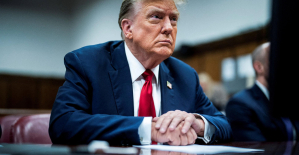 Lawyer, banker, teacher: who are the 12 members of the jury in Donald Trump's trial?
Lawyer, banker, teacher: who are the 12 members of the jury in Donald Trump's trial? After 13 years of mission and seven successive leaders, the UN at an impasse in Libya
After 13 years of mission and seven successive leaders, the UN at an impasse in Libya What High Blood Pressure Does to Your Body (And Why It Should Be Treated)
What High Blood Pressure Does to Your Body (And Why It Should Be Treated) Vaccination in France has progressed in 2023, rejoices Public Health France
Vaccination in France has progressed in 2023, rejoices Public Health France Food additives suspected of promoting cardiovascular diseases
Food additives suspected of promoting cardiovascular diseases “Even morphine doesn’t work”: Léane, 17, victim of the adverse effects of an antibiotic
“Even morphine doesn’t work”: Léane, 17, victim of the adverse effects of an antibiotic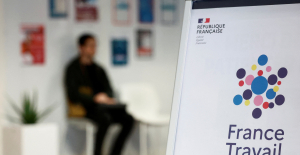 Unemployment insurance: tightening of the rules on July 1
Unemployment insurance: tightening of the rules on July 1 Cancers, chronic diseases... Billions of workers hit by climate change, warns the UN
Cancers, chronic diseases... Billions of workers hit by climate change, warns the UN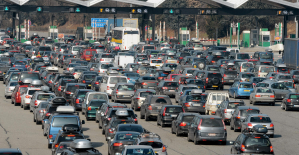 Closure of the A13 extended until at least mid-week
Closure of the A13 extended until at least mid-week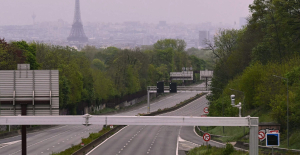 Closure of the A13: Pécresse “asks the State to take charge of making the A14 free”
Closure of the A13: Pécresse “asks the State to take charge of making the A14 free” The series adaptation of One Hundred Years of Solitude promises to be faithful to the novel by Gabriel Garcia Marquez
The series adaptation of One Hundred Years of Solitude promises to be faithful to the novel by Gabriel Garcia Marquez Racism in France: comedian Ahmed Sylla apologizes for “having minimized this problem”
Racism in France: comedian Ahmed Sylla apologizes for “having minimized this problem”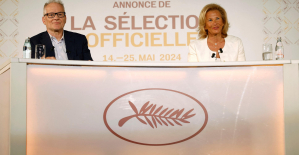 Mohammad Rasoulof and Michel Hazanavicius in competition at the Cannes Film Festival
Mohammad Rasoulof and Michel Hazanavicius in competition at the Cannes Film Festival UK lends Ghana treasures stolen during colonization
UK lends Ghana treasures stolen during colonization Skoda Kodiaq 2024: a 'beast' plug-in hybrid SUV
Skoda Kodiaq 2024: a 'beast' plug-in hybrid SUV Tesla launches a new Model Y with 600 km of autonomy at a "more accessible price"
Tesla launches a new Model Y with 600 km of autonomy at a "more accessible price" The 10 best-selling cars in March 2024 in Spain: sales fall due to Easter
The 10 best-selling cars in March 2024 in Spain: sales fall due to Easter A private jet company buys more than 100 flying cars
A private jet company buys more than 100 flying cars This is how housing prices have changed in Spain in the last decade
This is how housing prices have changed in Spain in the last decade The home mortgage firm drops 10% in January and interest soars to 3.46%
The home mortgage firm drops 10% in January and interest soars to 3.46% The jewel of the Rocío de Nagüeles urbanization: a dream villa in Marbella
The jewel of the Rocío de Nagüeles urbanization: a dream villa in Marbella Rental prices grow by 7.3% in February: where does it go up and where does it go down?
Rental prices grow by 7.3% in February: where does it go up and where does it go down? Europeans: “All those who claim that we don’t need Europe are liars”, criticizes Bayrou
Europeans: “All those who claim that we don’t need Europe are liars”, criticizes Bayrou With the promise of a “real burst of authority”, Gabriel Attal provokes the ire of the opposition
With the promise of a “real burst of authority”, Gabriel Attal provokes the ire of the opposition Europeans: the schedule of debates to follow between now and June 9
Europeans: the schedule of debates to follow between now and June 9 Europeans: “In France, there is a left and there is a right,” assures Bellamy
Europeans: “In France, there is a left and there is a right,” assures Bellamy These French cities that will boycott the World Cup in Qatar
These French cities that will boycott the World Cup in Qatar Basketball (F): big winner of Asvel, Basket Landes will face Tarbes in the semi-final of the League
Basketball (F): big winner of Asvel, Basket Landes will face Tarbes in the semi-final of the League Football: Yazici (Lille) “in shock” after an attempted theft at his home
Football: Yazici (Lille) “in shock” after an attempted theft at his home Serie A: victorious over AC Milan, Inter crowned Italian champions for the 20th time
Serie A: victorious over AC Milan, Inter crowned Italian champions for the 20th time Serie A: “Winning a title in a derby has never happened,” relishes Martinez after Inter’s coronation
Serie A: “Winning a title in a derby has never happened,” relishes Martinez after Inter’s coronation


















